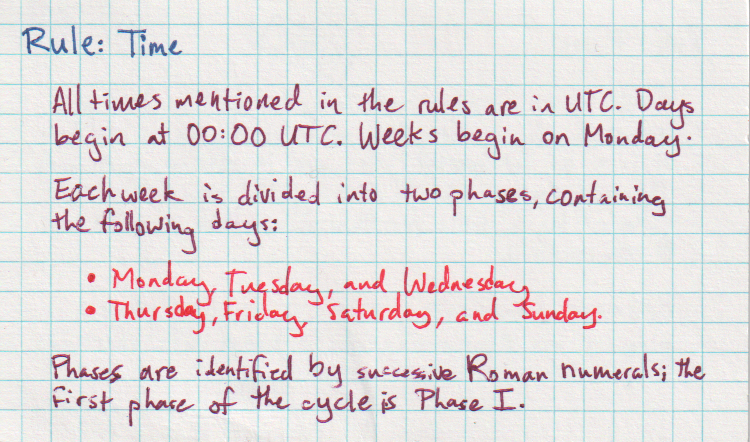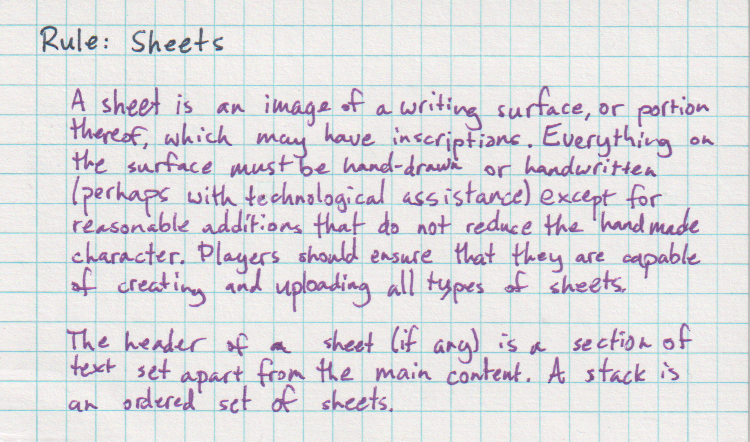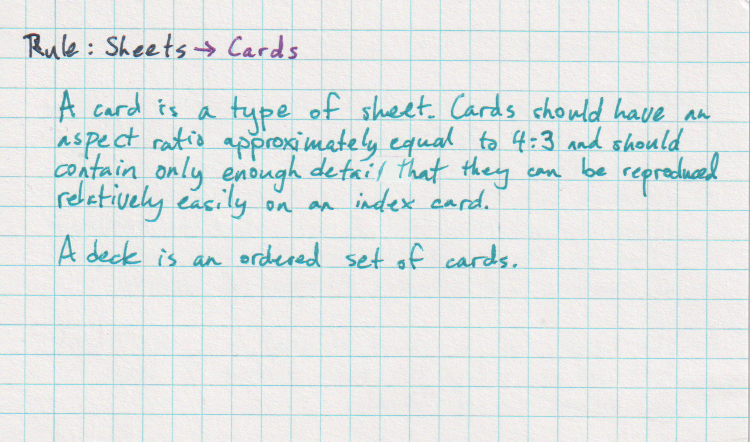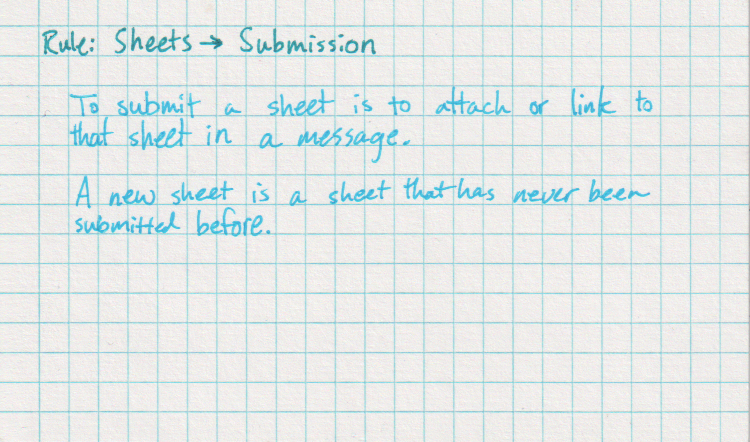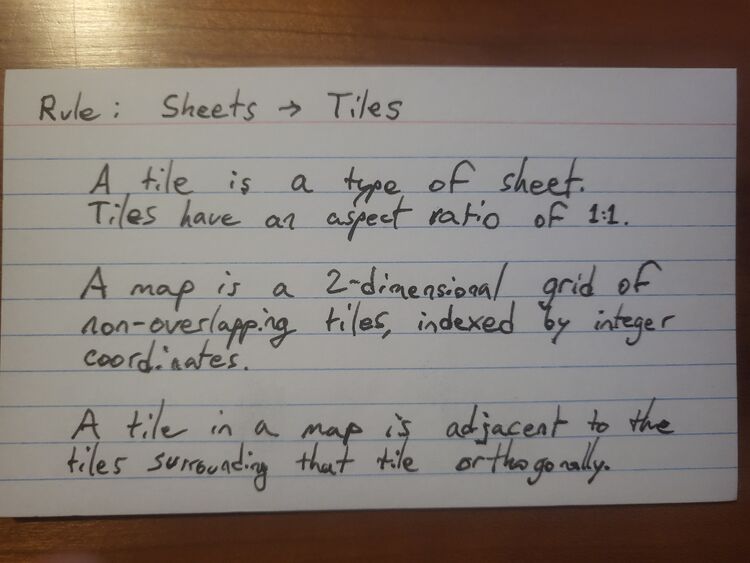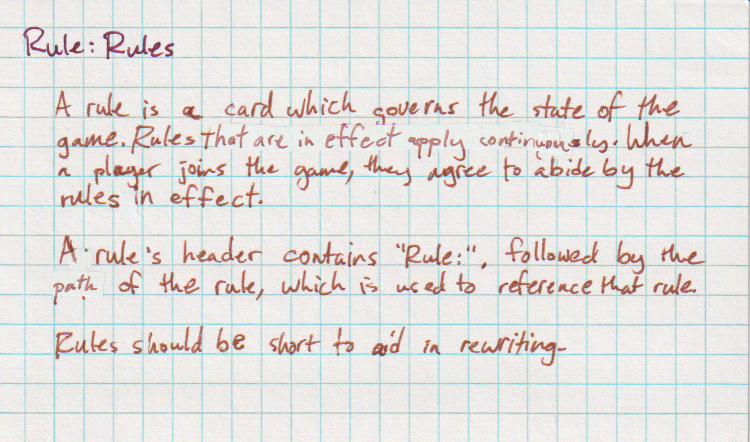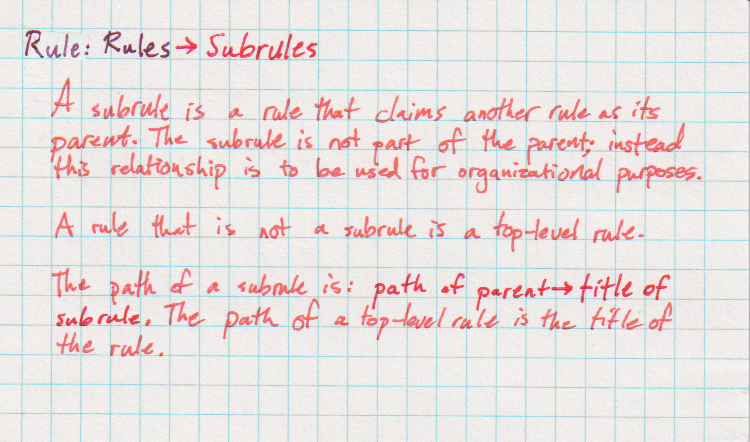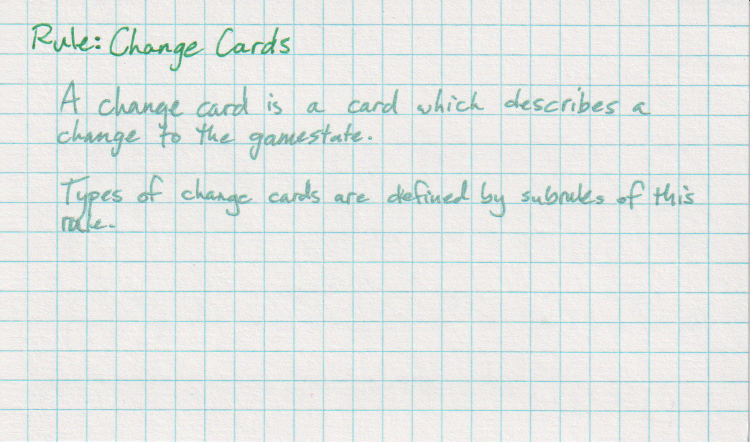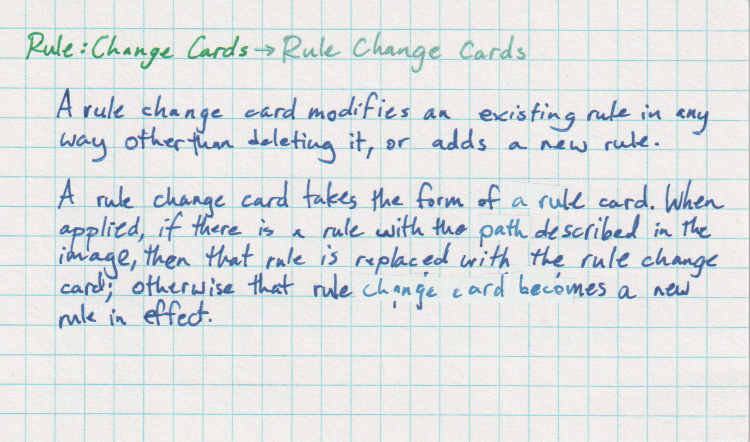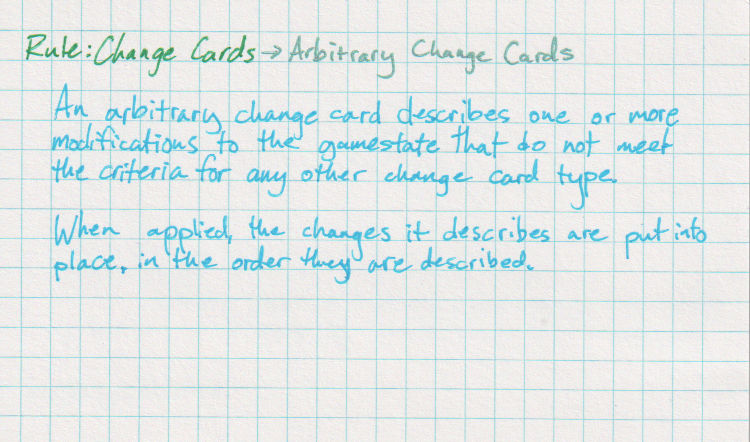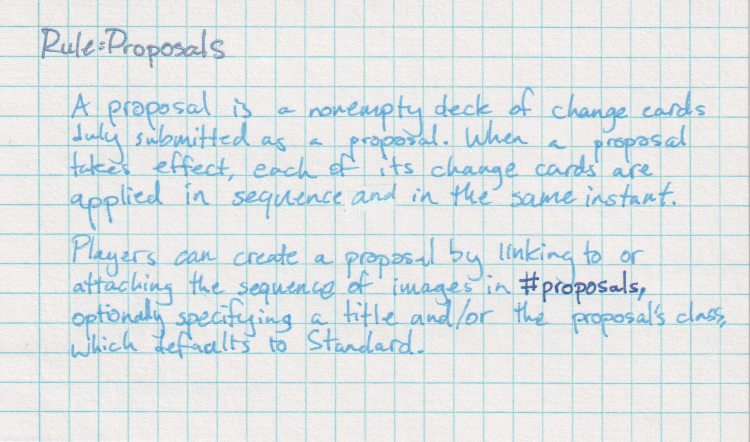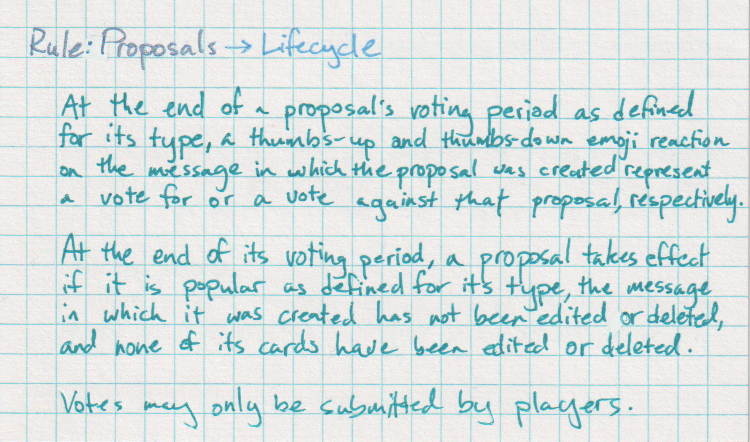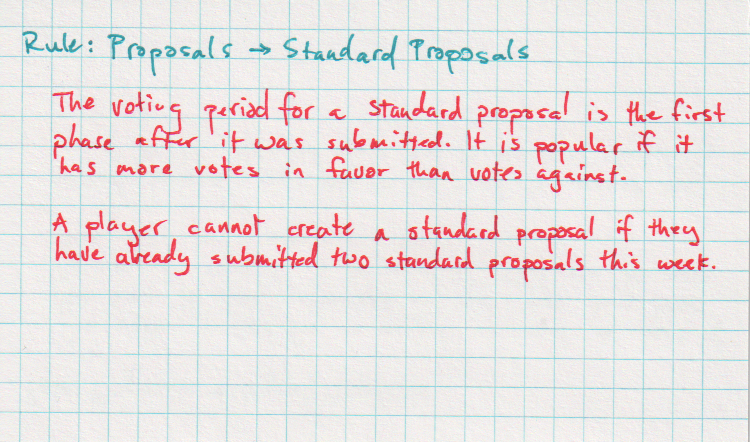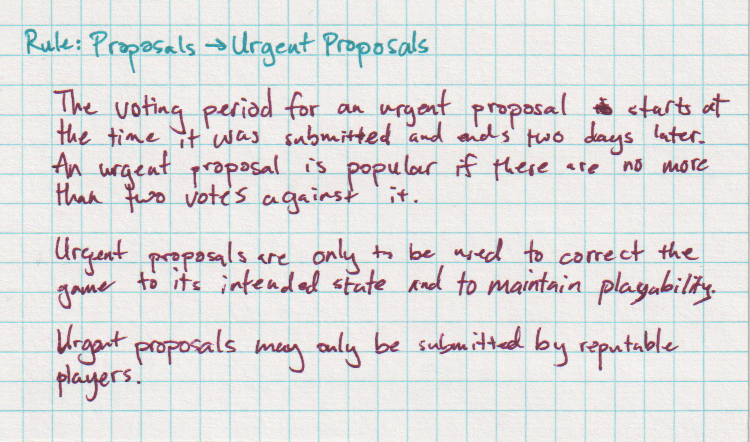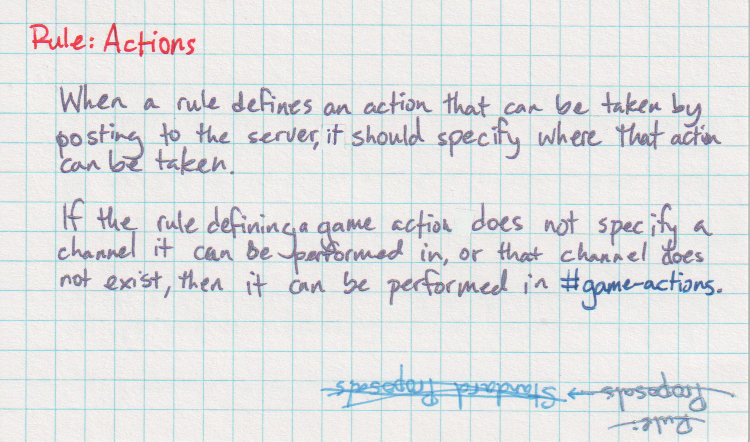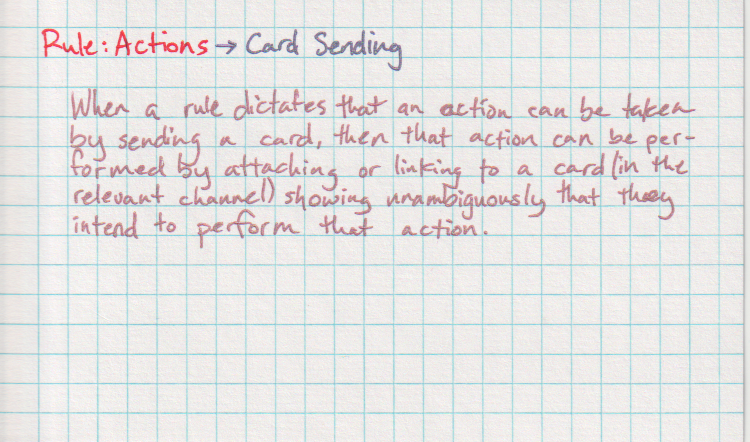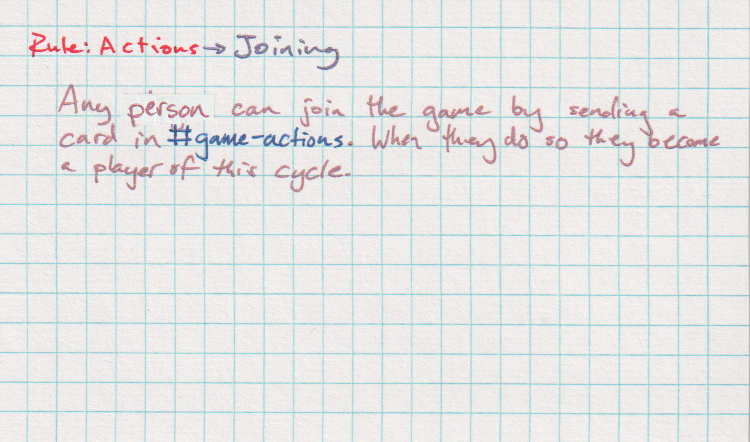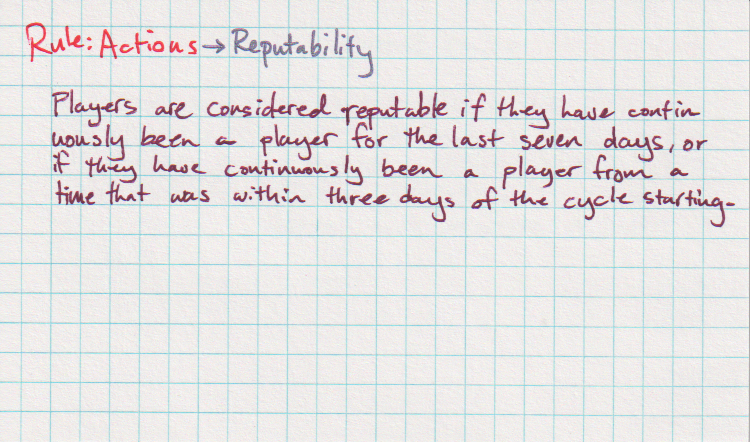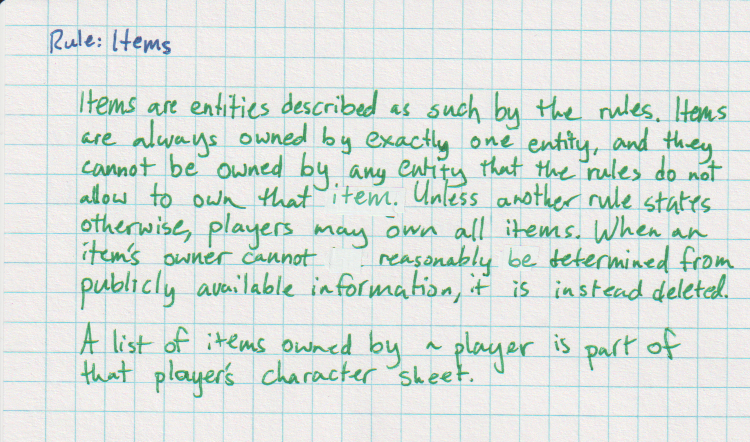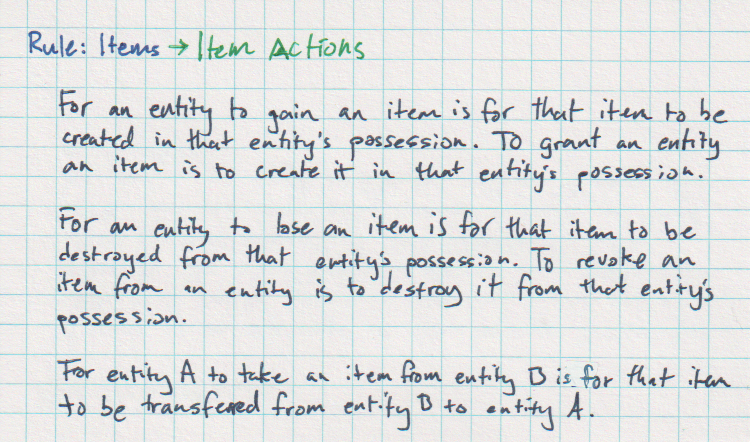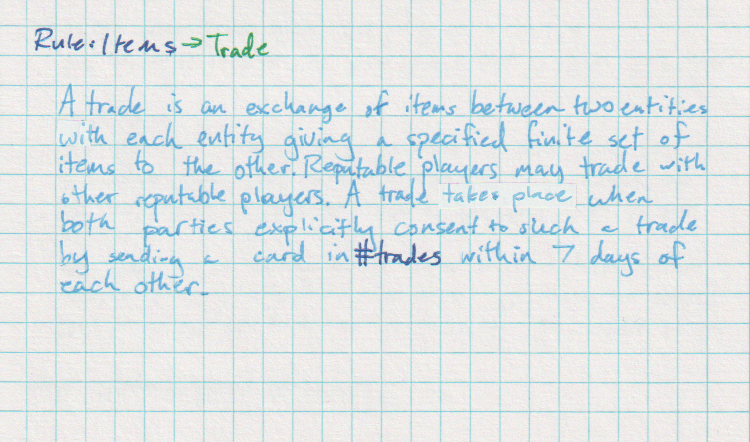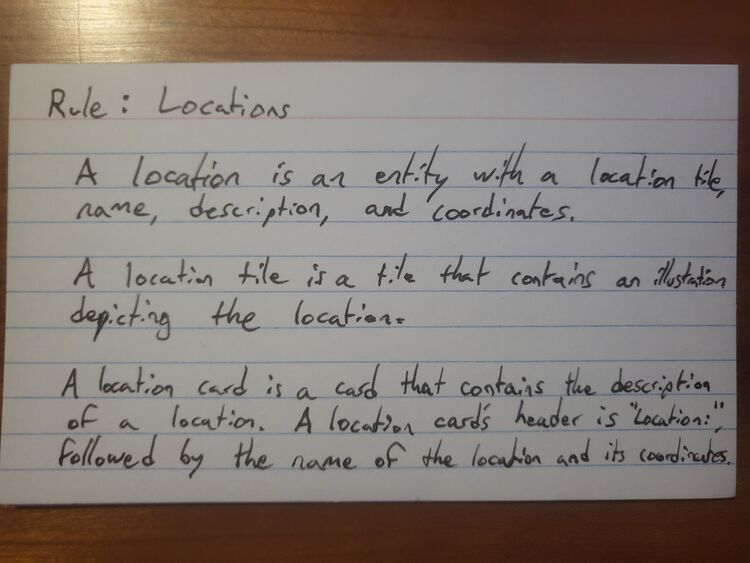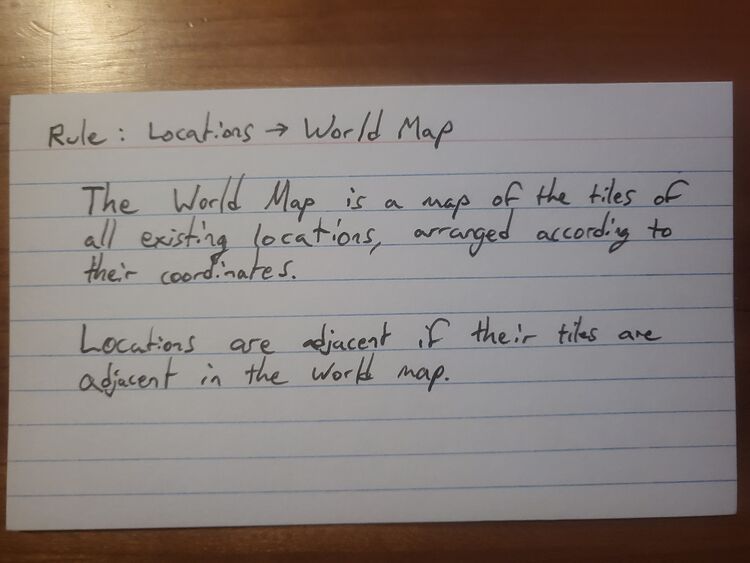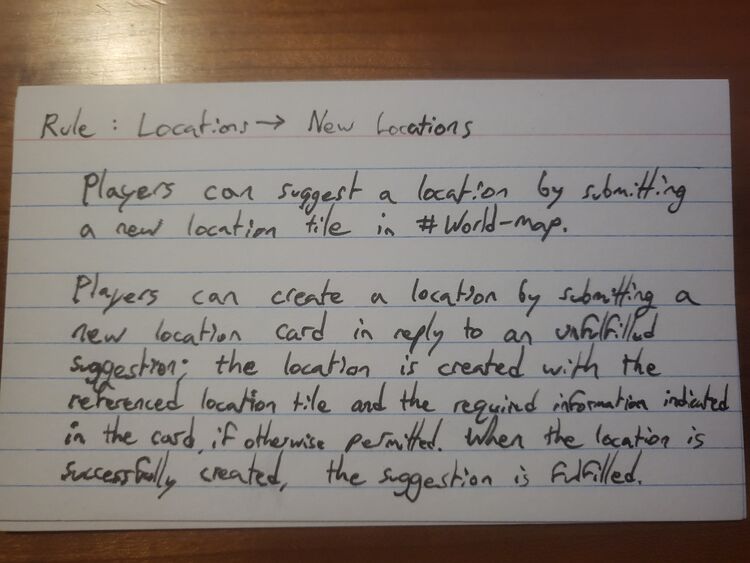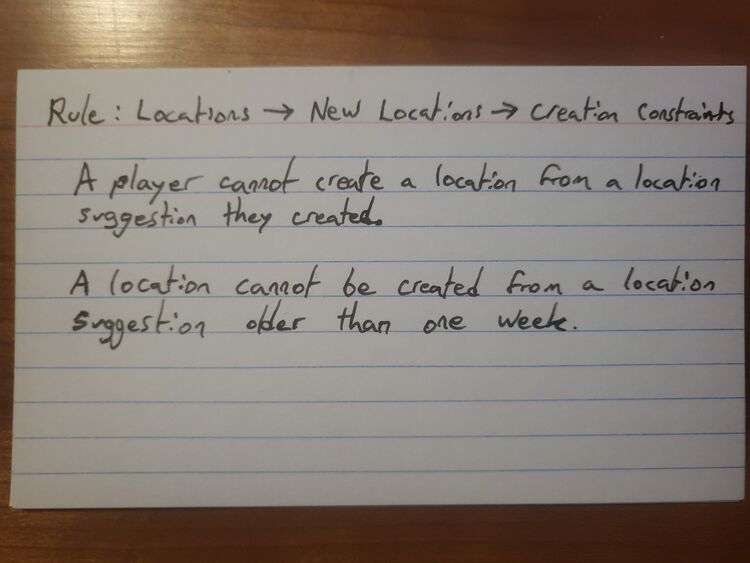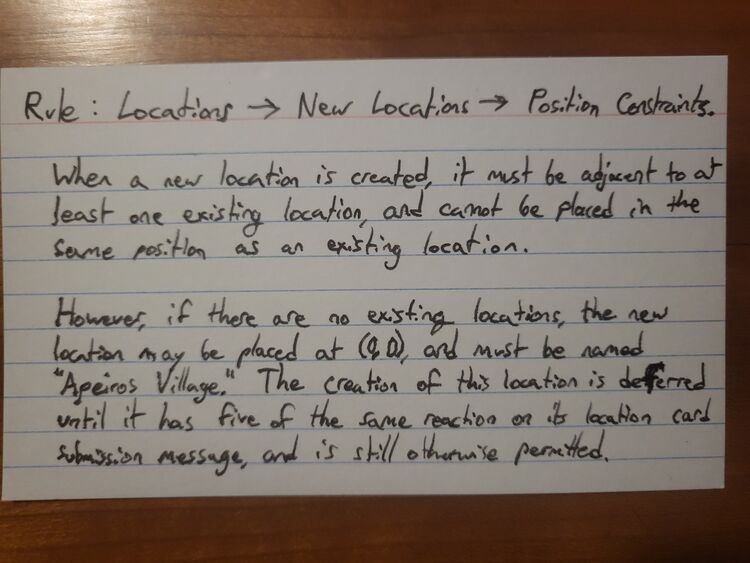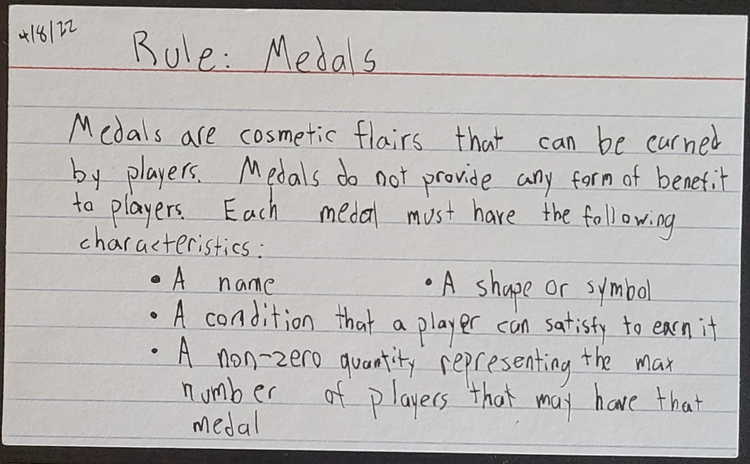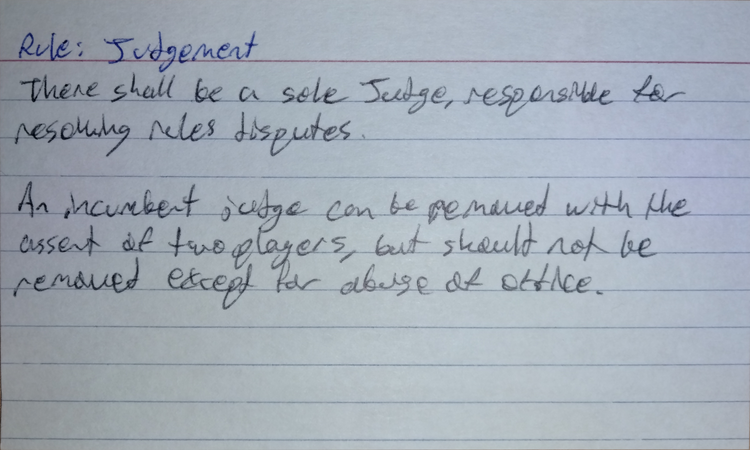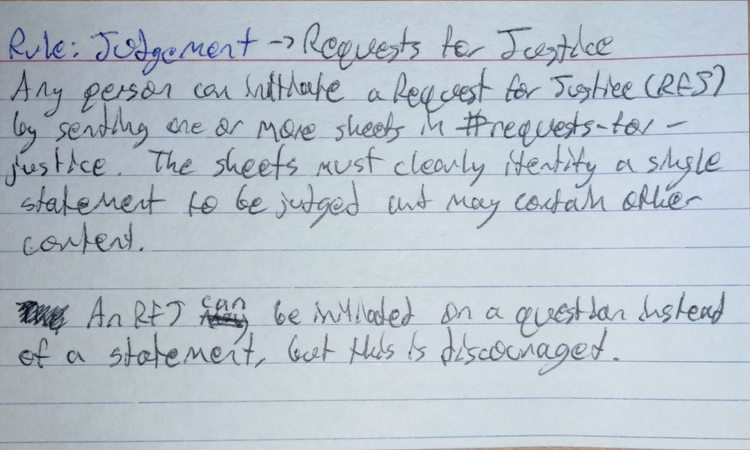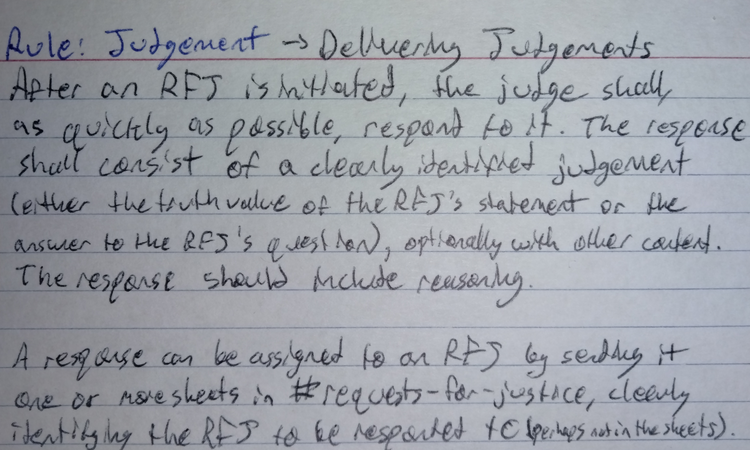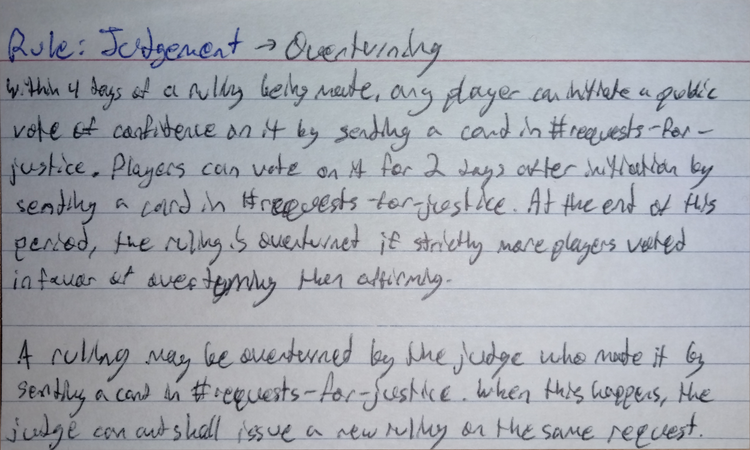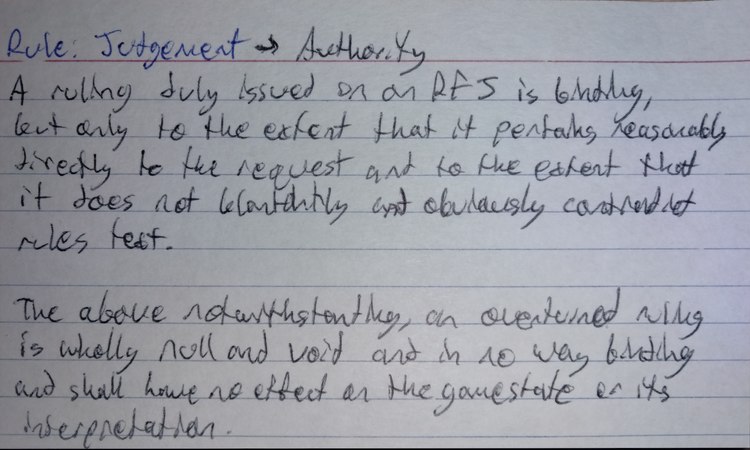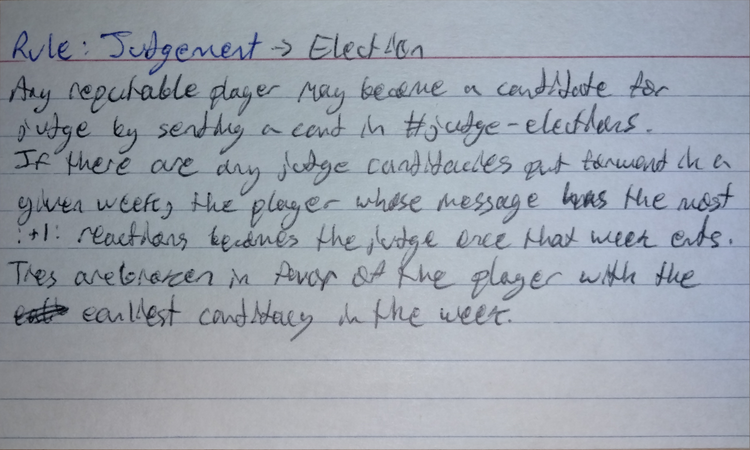Cycle 12/Ruleset: Difference between revisions
miraheze>Nyhilo →Tracking: Add transcript for the Tracking rule and its subrules |
miraheze>Nyhilo →Items: Add transcript for the Items rule and its subrules |
||
| Line 135: | Line 135: | ||
==Items== | ==Items== | ||
{{C12Card|Cycle 12-Rules-items.png}} | {{C12Card|Cycle 12-Rules-items.png|Transcript=<strong>Rule: Items</strong> | ||
<p>Items are entities described as such by the rules. Items are always owned by exactly one entity, and they cannot be owned by any entity that the rules do not allow to own that item. Unless another rule states otherwise, players may own all items. When an item's owner cannot reasonably be determined from publicly available information, it is instead deleted.</p> | |||
<p>A list of items owned by a player is part of that player's character sheet.</p>}} | |||
===Actions=== | ===Actions=== | ||
{{C12Card|Cycle 12-Rules-items-actions.png}} | {{C12Card|Cycle 12-Rules-items-actions.png|Transcript=<strong>Rule: Items → Item Actions</strong> | ||
<p>For an entity to gain an item is for that item to be created in that entity's possession.</p> | |||
<p>For an entity to lose an item is for that item to be destroyed from that entity's possession. To revoke an item from an entity is to destroy it from that entity's possession.</p> | |||
<p>For entity A to take an item from entity B is for that item to be transferred from entity B to entity A.</p>}} | |||
===Trade=== | ===Trade=== | ||
{{C12Card|Cycle 12-Rules-items-trade.png}} | {{C12Card|Cycle 12-Rules-items-trade.png|Transcript=<strong>Rule: Items → Trade</strong> | ||
<p>A trade is an exchange of items between two entities with each entity giving a specified finite set of items to the other. Reputable players may trade with other reputable players. A trade takes place when both parties explicitly consent to such a trade by sending a card in #trades within 7 days of each other.</p>}} | |||
==Locations== | ==Locations== | ||
Revision as of 22:17, 15 April 2022
Time
Rule: Time
All times mentioned in the rules are in UTC. Days begin at 00:00 UTC. Weeks begin on Monday.
Each week is divided into two phases, containing the following days:
- • Monday, Tuesday, and Wednesday
- • Thursday, Friday, Saturday, and Sunday.
Phases are identified by successive Roman numerals; the First phase of the cycle is Phase I.
Sheets
Rule: Sheets
A sheet is an image of a writing surface, or portion thereof, which may have inscriptions. Everything on the surface must be hand-drawn or handwritten (perhaps with technological assistance) except for reasonable additions that do not reduce the handmade character. Players should ensure that they are capable of creating and uploading all types of sheets.
The header of a sheet (if any) is a section of the text set apart from the main content. A stack is an ordered set of sheets.
Cards
Rule: Sheets → Cards
A card is a type of sheet. Cards should have an aspect ratio approximately equal to 4:3 and should contain only enough detail that they can be reproduced relatively easily on an index card.
A deck is an ordered set of cards.
Submissions
Rule: Sheets → Submission
To submit a sheet is to attach or link to that sheet in a message.
A new sheet is a sheet that has never been submitted before.
Tiles
Rule: Sheets → Tiles
A tile is a type of sheet. Tiles have an aspect ratio of 1:1.
A map is a 2-dimensional grid of non-overlapping tiles, indexed by integer coordinates.
A tile in a map is adjacent to the tiles surrounding that tile orthogonally.
Rules
Rule: Rules
A rule is a card which governs the state of the game. Rules that are in effect apply continuously. When a player joins the game, they agree to abide by the rules in effect.
A rule's header contains "Rule:", followed by the path of the rule, which is used to reference that rule.
Rules should be short to aid in rewriting.
Subrules
Rule: Rules → Subrules
A subrule is a rule that claims another rule as its parent. The subrule is not part of the parent; instead this relationship is to be used for organizational purposes.
A rule that is not a subrule is a top-level rule.
The path of a subrule is: path of parent → title of subrule. The path of the top-level rule is the title of the rule.
Change Cards
Rule: Change Cards
A change card is a card which describes a change to the gamestate.
Types of change cards are defined by subrules of this rule.
Rule Change Cards
Rule: Change Cards → Rule Change Cards
A rule change card modifies an existing rule in any way other than deleting it, or adds a new rule.
A rule change card takes the form of a rule card. When applied, if there is a rule with the path described in the image, then that rule is replaced with the rule change card; otherwise that rule change card becomes a new rule in effect.
Arbitrary Change Cards
Rule: Change Cards → Arbitrary Change Cards
An arbitrary change card describes one or more modifications to the gamestate that don not meet the criteria for any other change card type.
When applied, the changes it describes are put into place, in the order they are described.
Proposals
Rule: Proposals
A proposal is a nonempty deck of change cards duly submitted as a proposal. When a proposal takes effect, each of its change cards are applied in a sequence and in the same instant.
Players can create a proposal by linking to or attaching the sequence of images in #proposals, optionally specifying a title and/or the proposal's class, which defaults to Standard.
Lifecycle
Rule: Proposals → Lifecycle
At the end of a proposal's voting period as defined for its type, a thumbs-up and thumbs-down emoji reaction on the message in which the proposal was created represent a vote for or a vote against that proposal, respectively.
At the end of its voting period, a proposal takes effect if it is popular as defined for its type, the message in which it was created has not been edited or deleted, and none of its cards have been edited or deleted.
Standard Proposals
Rule: Proposals → Standard Proposals
The voting period for a standard proposal is the first phase after it was submitted. It is popular if it has more votes in favor than votes against.
A player cannot create a standard proposal if they have already submitted two standard proposals this week.
Urgent Proposal
Rule: Proposals → Urgent Proposals
The voting period for an urgent proposal starts at the time it was submitted and ends two days later. An urgent proposal is popular if there are no more than two votes against it.
Urgent proposals are only to be used to correct the game to its intended state and to maintain playability.
Urgent proposals may only be submitted by reputable players.
Actions
Rule: Actions
When a rule defines an action that can be taken by posting to the server, it should specify where that action can be taken.
If the rule defining a game action does not specify a channel it can be performed in, or that channel does not exist, then it can be performed in #game-actions.
Card Sending
Rule: Actions → Card Sending
When a rule dictates that an action can be taken by sending a card, then that action can be performed by attaching or linking to a card (in the relevant channel) showing unambiguously that they intend to perform that action.
Joining
Rule: Actions → Joining
Any person can join the game by sending a card in #game-actions. When they do so they become a player of this cycle.
Reputability
Rule: Actions → Reputability
Players are considered reputable if they have continuously been a player for the last seven days, or if tey have continuously been a player from a time that was within three days of the cycle starting.
Tracking
Rule: Tracking
A character sheet for a player is a sheet which should act as the basic form of gamestate tracking. It must contain all the information required of it by the rules, otherwise it is not a character sheet. Its header shall contain the words "Character Sheet" and the player it was created for.
Self-Updating
Rule: Tracking → Self-Updating
When a player takes some actions that change one or more values required to be tracked on their character sheet, they must attach or link to a new character sheet that reflects the gamestate as it would be if those actions were to succeed. This is called "Self-Updating".
Update Notifications
Rule: Tracking → Update Notifications
When a player takes some actions that would modify one or more values required to be tracked on another player's Character Sheet, they shall notify that person through Discord ping so that they may include those changes in their character sheet.
Medal Box
Rule: Tracking → Medal Box
A player's medals are tracked on their character sheet in a special portion labeled "Medal Box". Nothing may be inside this portion of the sheet except for icons representing medals that player has earned.
Items
Rule: Items
Items are entities described as such by the rules. Items are always owned by exactly one entity, and they cannot be owned by any entity that the rules do not allow to own that item. Unless another rule states otherwise, players may own all items. When an item's owner cannot reasonably be determined from publicly available information, it is instead deleted.
A list of items owned by a player is part of that player's character sheet.
Actions
Rule: Items → Item Actions
For an entity to gain an item is for that item to be created in that entity's possession.
For an entity to lose an item is for that item to be destroyed from that entity's possession. To revoke an item from an entity is to destroy it from that entity's possession.
For entity A to take an item from entity B is for that item to be transferred from entity B to entity A.
Trade
Rule: Items → Trade
A trade is an exchange of items between two entities with each entity giving a specified finite set of items to the other. Reputable players may trade with other reputable players. A trade takes place when both parties explicitly consent to such a trade by sending a card in #trades within 7 days of each other.
Locations
World Map
New Locations
Creation Constraints
Position Constraints
Medals
Participation
Cycle 12-Rules-medals.participation.png
